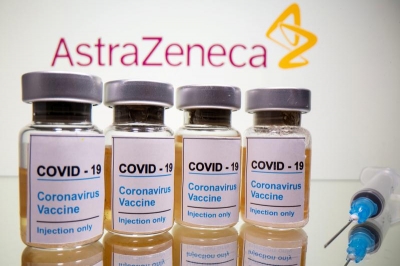AstraZeneca-Oxford COVID-19 vaccine is effective against Delta and Kappa variants, which were first identified in India, the UK pharma giant said on Tuesday.
The vaccine also manufactured by the Pune-based Serum Institute under the Covishield brand and is the mainstay of India’s vaccination campaign along with Bharat Bitoech’s Covaxin.
The study by Oxford University investigated the ability of monoclonal antibodies in blood from recovered people and from those vaccinated to neutralize the Delta and Kappa variants, the statement said.
Also read: Govt aims to administer 1 crore vaccine doses a day, after 85 lakh record on Monday
Last week, an analysis by the Public Health England (PHE) showed that vaccines made by Pfizer Inc and AstraZeneca offer high protection of more than 90% against hospitalization from the Delta variant.
The latest Oxford study results are built on the recent analysis by PHE, the company said.
"The Delta variant is well on its way to becoming the dominant variant globally because of its increased transmissibility," World Health Organization chief scientist Soumya Swaminathan said at a news conference on Friday.
Also read: Vaccination cuts chances of being hospitalised for Covid by 80%, govt study shows
U.S. infectious disease expert Dr. Anthony Fauci also said on Tuesday that the Delta variant of the novel coronavirus that was first found in India is the greatest threat to the United States’ effort to eradicate COVID-19.
"The transmissibility is unquestionably greater in the Delta variant than the original variant of COVID-19 and it is associated with an increased disease severity, Fauci said.
However, he said the vaccines authorized in the United States, including the Pfizer-BioNTech vaccine, are effective against the new variant of COVID-19.
The Delta variant had led to the sudden surge in COVID-19 cases in the second ferocious wave that had swept across India during April and May.
Britain has reported a steep rise in infections due to the Delta variant, while Germany's top public health official predicted it would rapidly become the dominant variant in the country.
Russian authorities blamed a sharp increase in COVID-19 cases vaccination hesitancy after a record number of new infections in Moscow, mostly with the new Delta variant.
The German company CureVac reported its vaccine proved only 47% effective at preventing disease which fell short of the WHO's 50% mark.
The company said it documented at least 13 variants circulating within its study population.
Given that similar mRNA vaccines from Pfizer and BioNTech and Moderna posted efficacy rates in excess of 90%, Swaminathan said the world had been expecting more from CureVac's candidate.
"Just because it's another mRNA vaccine, we cannot presume all mRNA vaccines are the same, because each one has a slightly different technology," Swaminathan said, adding the surprise failure underscored the value of robust clinical trials to test new products.




















